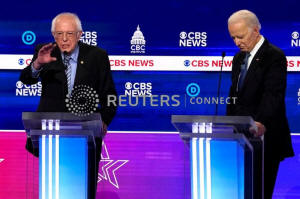Coronavirus crisis offers Biden, Sanders a chance to bridge Democratic
Party's divide at Sunday's debate
 Send a link to a friend
Send a link to a friend
 [March 14, 2020]
By Amanda Becker and James Oliphant [March 14, 2020]
By Amanda Becker and James Oliphant
WASHINGTON (Reuters) - After all the rancor
of the Democratic presidential race, front-runner Joe Biden has a chance
in Sunday's debate to extend an olive branch to Bernie Sanders and his
fervent supporters in a bid for party unity before the general election
fight.
Growing concerns about the coronavirus pandemic and the Trump
administration's handling of the U.S. response could minimize conflict
between the two rivals as they look instead to contrast their leadership
with the Republican president's in a time of crisis, Democratic
strategists say.
Sunday's debate may be the last such event of the Democratic nominating
contest and comes at a time when the global coronavirus outbreak has
rocked American life.
The crisis has prompted school closures and cancellations of sports
tournaments and games, music concerts and political rallies in an
election year. The debate itself was moved to Washington from Arizona
and will have no in-person audience due to concerns about the
coronavirus.

Following a string of nominating contest victories, Biden leads Sanders
in delegates, and next week's primary elections could put the former
vice president on a nearly unstoppable path to the nomination.
The centrist Biden may now be in a position to try to find common ground
with Sanders, a democratic socialist, a move that could help mend the
fissure in the party between moderates and progressives, according to
party veterans.
“Sunday’s debate could be an important step to heal and strengthen the
party," said Hari Sevugan, recently a top aide to former presidential
candidate Pete Buttigieg. “A measured, respectful conversation could go
a long way.”
The winner of the Democratic primary contest will face President Donald
Trump in the Nov. 3 election.
Edison Research exit polls from Tuesday's nominating contests showed
that voters trust Biden to most effectively handle the response to the
virus over Sanders. The health crisis is expected to take center stage
on Sunday, providing another opening for Biden to position himself as a
unifying force, strategists said.
The former vice president is not prone to conflict with fellow
Democrats. The question remains whether the pugnacious Sanders, a U.S.
senator from Vermont and an independent, would follow suit or keep
trying to draw a clear contrast between the himself and Biden.
Some Democrats say lingering tensions between Sanders and presidential
rival Hillary Clinton in 2016 played a role in her upset loss to Trump.
After being routed by Biden in Michigan and other primaries on Tuesday,
Sanders seemed to signal he was less interested in attacking Biden
personally and more intent on pushing him to address issues such as
universal healthcare coverage, college affordability, climate change and
poverty.
And Sanders suggested that if Biden is the nominee, he will need to
appeal to young voters and Latino voters who have gravitated to Sanders.
For Biden, the challenge may be figuring out how to thread the needle of
expressing support for Sanders' efforts without aligning himself with
his policies.
Biden can say that "while they share the same goals, they differ on the
prescription," Sevugan said.
[to top of second column]
|

Democratic 2020 U.S. presidential candidates Senator Bernie Sanders
makes a point as former Vice President Joe Biden listens at the
tenth Democratic 2020 presidential debate at the Gaillard Center in
Charleston, South Carolina, U.S. February 25, 2020. REUTERS/Jonathan
Ernst/File Photo

'AN OPEN HAND'
Biden’s team is under pressure from allies of Sanders and Senator
Elizabeth Warren, another former presidential candidate, to adopt
policies popular with progressives such as a wealth tax, a
stepped-up estate tax and an equal-pay plan, according to several
strategists familiar with the conversations.
A wealth tax "one, is supported by both Senators Sanders and Warren
and two, speaks to the fundamentals of who the Democratic Party
should be making clear they fight for,” said a Democratic strategist
who was close to Warren's campaign.
A similar dynamic played out between Sanders and Clinton in the 2016
primary, when Sanders said he would not drop out even after it
became clear she would be the nominee.
The progressive wing of the party then successfully pushed for the
addition of policies, including a $15-an-hour minimum wage, to the
party’s convention platform. Sanders ultimately endorsed her.
Brian Fallon, Clinton's spokesman in 2016, said that while Sanders’
supporters were unlikely to be “fully transferable” to Biden,
Biden’s team must work to earn the support of as many as possible to
avoid the narrow loss Clinton suffered.
“It begins with rhetorically stretching out an open hand,” Fallon
said.
Biden has been resistant to Sanders’ Medicare for All plan, which
would replace private health insurance, arguing it is too costly and
that many Americans prefer to keep their current insurance.
Wendell Potter, a former healthcare executive who now works as an
advocate for a government-run plan, said Biden must at least concede
“the problems of our healthcare system are more severe than he’s
acknowledging.”
Exit polls of Democratic voters from recent primaries showed strong
support for Medicare for All.
Biden has promised to "build on" Obamacare by adding a public option
that would leave the private insurance system in place.

Earlier this week, Biden praised the passion of Sanders and his
supporters and promised to deliver a “bold, progressive vision to
the American people.”
But his campaign has yet to indicate it would be inclined to embrace
any of Sanders’ signature proposals. Biden's agenda in its current
form would already make him the most progressive Democrat in history
if elected, a campaign aide said.
Matt Bennett, a vice president for Third Way, a Democratic think
tank that advocates for centrist policies, said Biden could not
afford to break leftward after moderates in the party coalesced
around him.
“The guy who comes in second doesn’t get concessions,” Bennett said.
“The problem with Bernie is that his ideas are so huge, they are
sinking his campaign. Biden can’t take those on.”
(Reporting by Amanda Becker and James Oliphant; Editing by Colleen
Jenkins, Peter Cooney and Jonathan Oatis)
[© 2020 Thomson Reuters. All rights
reserved.] Copyright 2020 Reuters. All rights reserved. This material may not be published,
broadcast, rewritten or redistributed.
Thompson Reuters is solely responsible for this content. |